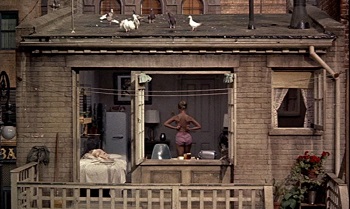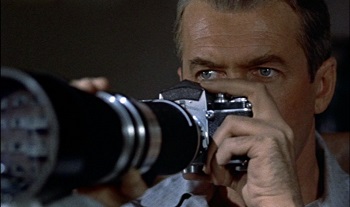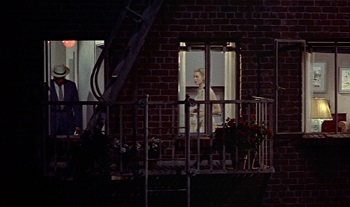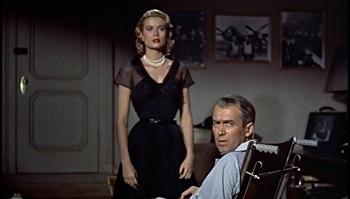""Neighbors like each other, speak to each other, care if anybody lives or dies! But none of you do!""
 While it's hard to decide which Hitchcock film is my favorite, I consider Rear Window to be his best and most accessible film. If I were going to turn anyone onto his filmography, this is what I would consider the best starting point.
On the technical side, Rear Window is one of the most unique because the entire film takes place inside a single room, but where the true mastery in presentation lies is in the apartments across the street. I have heard many reviews in the past to other films where the setting is so conscious and featured throughout that it is considered a character as well. In Rear Window, the setting IS the main character.
While it's hard to decide which Hitchcock film is my favorite, I consider Rear Window to be his best and most accessible film. If I were going to turn anyone onto his filmography, this is what I would consider the best starting point.
On the technical side, Rear Window is one of the most unique because the entire film takes place inside a single room, but where the true mastery in presentation lies is in the apartments across the street. I have heard many reviews in the past to other films where the setting is so conscious and featured throughout that it is considered a character as well. In Rear Window, the setting IS the main character.
Through Jeff's photo lens, we see a conscious collective of supporting characters going about their daily routines, and while seen only from afar, this depiction helps flesh them out into three-dimensional people who are believably real. Speaking of believability, the main cast is incredibly convincing in their realism. The relationship between Jeff and Lisa is entertaining on its own, but perhaps the real standout is Thelma Ritter's Stella, Jeff's nurse, whom I found to be quite the scene-stealer. All three leads have fantastic chemistry and personality, but it is the scenes with Stella that are the most standout and entertaining. She is a very witty and abrasive person who is hard not to love and I don't think Ritter gets enough credit when up against everything else that makes this one of the closest any director has come to a perfect film.
I know the last part of that sentence may spur disagreements and arguments but I stand by that. Rear Window has everything a classic masterwork should have. Like 12 Angry Men, it takes place within one room and is based heavily around dialogue and at the core there is a seemingly simple story with a seemingly simple antagonist. Raymond Burr as Lars Thorwald is such a unique villain because he is so simple. He is not a theatrical creepy and sinister psycho like Bruno Anthony in Strangers on a Train or Brandon Shaw from Rope. He is not the two-faced charming sociopath that Uncle Charlie is in Shadow of a Doubt. He is just a simple man who has committed a very heinous act and because of his simplicity, is almost able to get away with what he has done. Almost...if not for the man who unwillingly, and at first unknowingly witnessed his crime. Another of the key aspects to what makes this film so great is James Stewart as Jeff. Like his character in Rope, Jeff is an unconventional detective. He has no experience as an investigator but his intelligence and persistence to not give up is what makes him such a fun and entertaining character to watch and listen to. Jeff knows what's going on and refuses to do what everyone else does. What does everyone else do exactly? They put up their blinds, both figuratively and literally, and prefer not to get involved. They convince themselves that the murder is only in Jeff's head because subconsciously they all cannot handle the possibility that he is in fact right, because then the murder of an innocent woman becomes a troubling part of their thoughts. It intrudes on their daily lives and this is very real and common in most people. We convince ourselves that something so horrible has not happened because that would upset us and we don't like to be upset. We do our best to be anything but.
Another of the key aspects to what makes this film so great is James Stewart as Jeff. Like his character in Rope, Jeff is an unconventional detective. He has no experience as an investigator but his intelligence and persistence to not give up is what makes him such a fun and entertaining character to watch and listen to. Jeff knows what's going on and refuses to do what everyone else does. What does everyone else do exactly? They put up their blinds, both figuratively and literally, and prefer not to get involved. They convince themselves that the murder is only in Jeff's head because subconsciously they all cannot handle the possibility that he is in fact right, because then the murder of an innocent woman becomes a troubling part of their thoughts. It intrudes on their daily lives and this is very real and common in most people. We convince ourselves that something so horrible has not happened because that would upset us and we don't like to be upset. We do our best to be anything but.
That is the exact nature of neighbors in real life, especially when they live in apartments. They are aware of each other, but prefer not to interact and look out for one another. They are deliberately detached, as most inhabitants of apartments are. As I stated before, the neighbors have very specific personalities and provide for a number of subplots that span throughout the film without giving it any congestion. There is the eye candy that is the sexy, statuesque ballet dancer who unknowingly entertains Jeff by dancing around her apartment in her bra and panties, the troubled pianist who feels alienated from the world around him, the newlywed couple who seem to spend most of their time in bed, Mr. Thorwald and his wife (we'll get to them soon enough) and the woman dubbed by Jeff as "Miss Lonely Heart" who is my favorite of the neighbors as well as quite possibly my favorite part of the film overall.
She is my favorite specifically because of a scene where Jeff watches her, alone in her apartment getting dolled up and preparing a romantic dinner. Jeff assumes she finally has a date, but instead he sees that she is only pretending to have a date. She invites into her home an imaginary man whom she tends to and dines with and even shares a romantic embrace. As she stares across the table lovingly and raises a glass to her invisible date, Jeff looks across at her with compassionate affection and happily raises his glass to her from his apartment. Then he sees her smile shatter into a frown as she breaks down in tears over the reality of her lonely and isolated existence. It's a scene that affected me so deeply and by the time she brings her head down to wallow in her misery, I found myself sharing those tears with her. It is an incredibly emotional scene that stuck out and dented me more than any other in the film and was so effective that just thinking about it now gets me choked up. So without dissecting the plot too much, I would like to discuss what makes Mr. Thorwald such a unique villain. Jeff watches Thorwald and his wife's marriage disintegrate. He sees their frustration and contempt for each other. She is bedridden and is an obvious thorn in her husband's side. A series of events occur, including her sudden disappearance and Jeff's curiosity intensifies as he continues to spy on Thorwald. Jeff deduces that he has done something to his wife and is methodically cleaning his tracks, so much so that even Jeff's friend who is an experienced detective investigates at his friend's insistence but fails to be convinced. It plays again into how we as humans can alter our perceptions into seeing and believing only what we want to out of a subconscious fear of getting involved in a situation that is overbearing and requires more of our precious time and undivided attention.
It's a scene that affected me so deeply and by the time she brings her head down to wallow in her misery, I found myself sharing those tears with her. It is an incredibly emotional scene that stuck out and dented me more than any other in the film and was so effective that just thinking about it now gets me choked up. So without dissecting the plot too much, I would like to discuss what makes Mr. Thorwald such a unique villain. Jeff watches Thorwald and his wife's marriage disintegrate. He sees their frustration and contempt for each other. She is bedridden and is an obvious thorn in her husband's side. A series of events occur, including her sudden disappearance and Jeff's curiosity intensifies as he continues to spy on Thorwald. Jeff deduces that he has done something to his wife and is methodically cleaning his tracks, so much so that even Jeff's friend who is an experienced detective investigates at his friend's insistence but fails to be convinced. It plays again into how we as humans can alter our perceptions into seeing and believing only what we want to out of a subconscious fear of getting involved in a situation that is overbearing and requires more of our precious time and undivided attention.
The other fantastic aspect of Rear Window is that it is an unconventional romance. Jeff and Lisa's relationship is a strained one right from the beginning and he attempts to convince both Lisa and himself of this. While he seems callous at first, explaining that they are too different to enjoy each other as much as they should, we learn it is more of a self-esteem issue; that he thinks Lisa is too good for someone as practical and down in the dirt as he is. They are depicted just as Jeff perceives their relationship, but as Lisa becomes convinced by Jeff's accusations of what is happening across the courtyard, that's where the film starts to get really, really good. She becomes involved in Jeff's investigation and through this time together, he learns that there is a risk taker within who doesn't mind getting her feet wet and leaping without looking. When he sees the satisfaction she gets from the adrenaline rush of their investigation, the viewer can see the sparks that fly between them and how it strengthens their love and devotion for each other.
The suspense, like all Hitchcock films, is absolutely sublime, and without giving much away, the scene where a certain character goes to great lengths to prove Thorwald's guilt is one of the most nail-biting moments in film history. James Stewart's performance is all-around entertaining, but it is in this particular scene where he conveys exactly what the viewer is feeling in that moment and one can't help but sympathize entirely with him in that sequence. It is simply electrifying and while we can suspect where things may go from there, we never quite know exactly what will happen next.
James Stewart's performance is all-around entertaining, but it is in this particular scene where he conveys exactly what the viewer is feeling in that moment and one can't help but sympathize entirely with him in that sequence. It is simply electrifying and while we can suspect where things may go from there, we never quite know exactly what will happen next.
Rear Window truly is one of the greatest films of all time, and as before, I stand by this being Hitchcock's closest attempt at making a perfect film. Even beyond the director, I find it to be one of the closest we'll ever get to perfection.
See this film as soon as possible, and if you already have, then watch it again. It's so effective and timeless that I can see myself revisiting it throughout the years to come.
Please feel free to discuss "Rear Window" here, in our forums!

